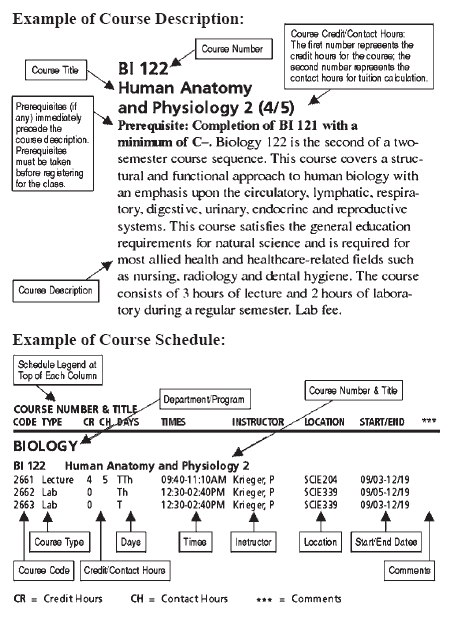Grand Rapids Community College is authorized to grant certificates and Associate degrees. Associate degrees are often referred to as “two-year” degrees. The use of the terms “two year college” and “four-year institution” is common. This is not an indication that degree completion is required in two calendar years or four but simply that a degree could be earned within that time frame. In fact, there are generally no time constraints for completing degree requirements, particularly at the community college level. As always, there are some exceptions, usually in health programs and law enforcement.
The most common two-year degree is the Associate of Arts (AA), which refers to a program of study that includes no less than 60 semester credits. GRCC also awards several other Associate degrees: the Associate of Science (AS), Associate of Music (AM), Associate Degree Nursing (ADN), Associate of Business (AB), Applied Arts and Sciences (AAAS), Associate of Fine Arts (AFA), and Associate of General Studies (AGS). Requirements for each degree are described in detail in the General Requirements section .
The Associate of Arts and the Associate of Science are the two degrees most often referred to as transfer degrees. These degrees include a distribution of credits that fulfills general education requirements for many four-year colleges and universities in Michigan. Courses required for certificate programs, generally 30-32 credits, are often found in their counterpart Associate of Applied Arts and Sciences degree. The AAAS is designed to prepare students for employment. Many of these associate degrees may also be transferred to four-year programs.
Students attending GRCC may choose their course load. To be considered full-time, a student must be enrolled in 12 or more credits for the semester. Part-time enrollment would consist of any number of credits less than 12 in any given semester. The number of credits for which a student enrolls influences financial aid. Some scholarships and insurance carriers may require full-time enrollment.
GRCC acts as a bridge to the bachelor’s degree. The bachelor’s degree acts as the step to graduate work that would lead to a master’s degree or doctorate in a particular field.
Help in choosing a major can be found at the Counseling and Career Center on the third floor of the Student Center. The Counseling and Career Center offers individual appointments, evaluation opportunities, seminars, and workshops to help students clarify career decisions.
GRCC College Catalog
GRCC Transfer Guide
GRCC publishes two documents designed to help students select and enroll in courses: the Transfer Guide and the College Catalog. The College Catalog includes a section called COURSE DESCRIPTIONS. The Transfer Guide is designed to inform students interested in transferring of the desired course choices for their major related to their transfer institution. Following is an example and explanation of the information.

Transfer Information
In order to verify transfer credits, students are responsible for contacting the college or university to which they wish to transfer. Each institution reserves the right to make changes in transfer requirements without prior notification.
Students who plan to attend another college or university should:
- Utilize the GRCC Transfer Guide and online resources such as the GRCC Counseling and Career Center web page.
- Discuss transfer requirements with a GRCC counselor.
- Confer with college representatives who visit GRCC.
- Apply for transfer admission well in advance of the anticipated date of transfer.
- File a request with Student Records – Office of the Registrar that an official transcript be mailed to the transfer institution.
- Be aware that the transfer institution reserves the right to recalculate grades and grade point averages.
- Request the Student Records Office to note that the Michigan Transfer Agreement requirements have been met, if applicable, on transcript.
Transferability
Although most colleges and universities accept credits from other institutions that are accredited, not all courses transfer everywhere. Since GRCC is institutionally accredited, its credits are more likely to transfer than otherwise. However, most receiving institutions have certain grade requirements for transfer, and they have the right to reject credits they don’t recognize. A college of arts and sciences might not be willing to accept a course in a field they don’t have—although some colleges will accept “unrecognized” credits as elective credits. Developmental courses usually do not transfer. The receiving institution decides if a GRCC course will be considered developmental at that institution. Counselors can help students determine the transferability of particular courses.
Do All Colleges Teach the Same Courses the Same Way?
Most colleges and universities offer some of the same classes; for example, Freshman Composition, General Psychology, College Algebra. Often the titles are not the same, but there is a transfer equivalency—which means the content is similar enough that one institution will transfer the course from another institution. However, there is neither standard content nor standard method of teaching for all colleges. While some states have agreements that courses at two-year colleges will be the same as those of the same name or number at four-year colleges, Michigan does not. Consequently, it’s possible for what appears to be the same course at two different institutions to cover different material and opinions and to have different styles of teaching. This diversity is one of the strengths of higher education in the United States.
General Education for Transfer Students
Virtually all colleges and universities require a variety of courses in English, the humanities, the biological and physical sciences, and the social sciences. The sequence of these courses is termed general education. General education courses serve to broaden the intellectual background of the average student regardless of the specific subject area in which the student may be interested.
Typically, four-year colleges and universities have two sets of requirements: (a) the general education requirements which all students must fulfill and the majority of which are taken during the freshman and sophomore years, and (b) the requirements of a specialization, commonly known as the major, the majority of which are taken during the junior and senior years.
|